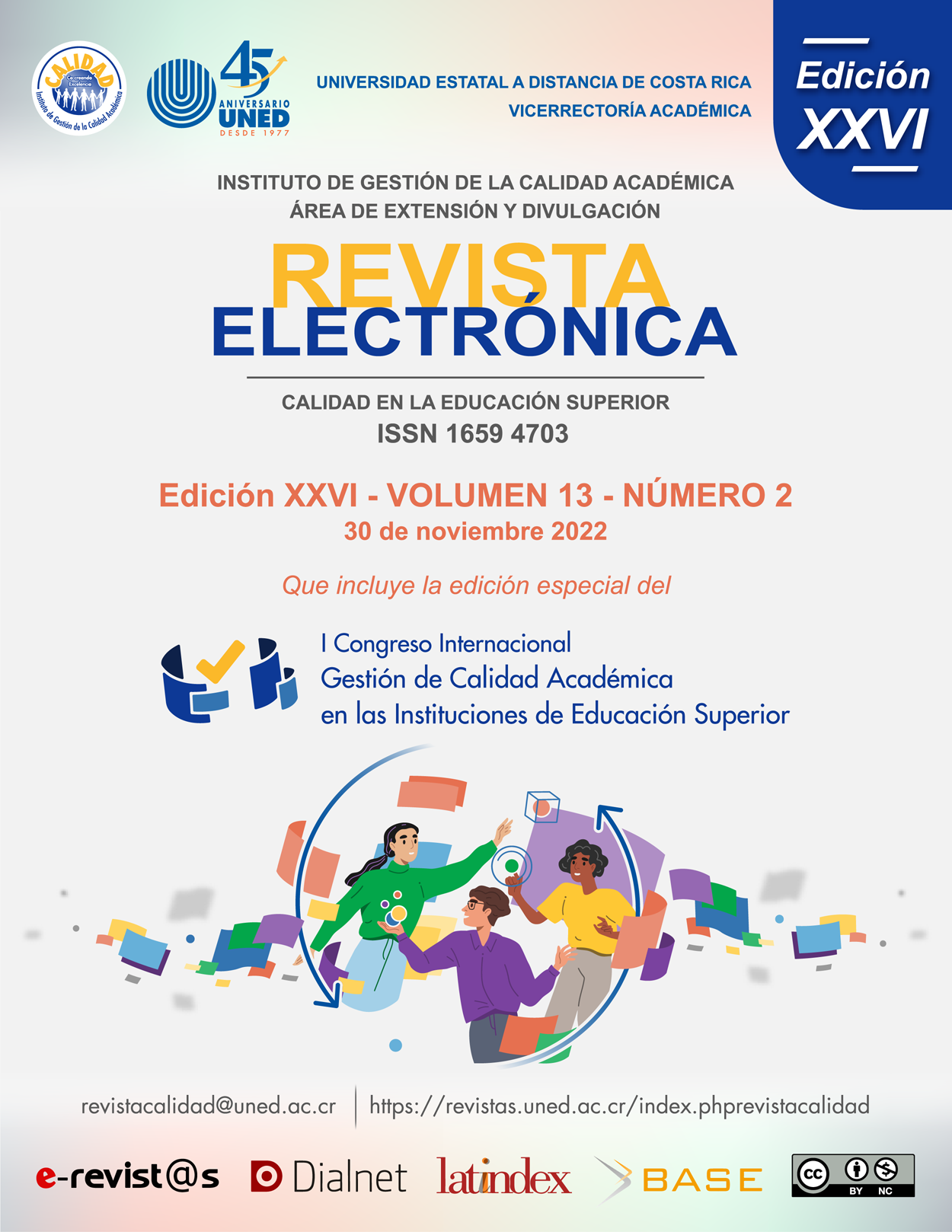Application of virtual laboratories in the Telecommunications Engineering degree program, UNED
DOI:
https://doi.org/10.22458/caes.v13i2.4487Keywords:
Virtual laboratory, distance education, academic mediation, telecommunications, meaningful learningAbstract
The application of virtual and remote laboratories in Telecommunications Engineering is essential in its 100% virtual education model, since its inception in 2016. The objective of this work is to evaluate the results obtained and the mechanism of their application. The methodology applied was qualitative under a grounded theory design, where the results are contrasted with the theory and the authors are an active part of the process. The main results are the positive evaluation by the graduates of the course and the generation of significant learning through innovative mediation. The main conclusion is that the laboratories have fulfilled their objective and that the mediation is innovative. It is recommended that the course should be constantly updated and give more flexibility in mediation.
References
Andrés, C., Anchetta, G., Barboza-Robles, Y., y Peraza-Delgado, M. (2020). Estrategias de mediación pedagógica de las unidades didácticas de la Universidad Estatal a Distancia de Costa Rica. UNED Research Journal, 12(1). e2940-e2940.
Arias-Navarro, E. y Arguedas-Matarrita, C. (2020). El trabajo experimental en la enseñanza de la Física en tiempos de pandemia mediante el uso de la aplicación II Ley de Newton en la UNED de Costa Rica. Innovaciones Educativas, 22(Especial), 103-114.
Corral, M. M. (2020). Sociedad 5.0 y tecnologías emergentes al 2030. Sistemas, (154), 4-6.
Cortés-Rico, L. (2020). Hacia una sociedad superinteligente. Sistemas, (154), 8-12.
Espeso-Molinero, P. (2017). Características y retos de la investigación acción participativa (IAP). Una experiencia personal en investigación turística. Dimensiones turísticas. 1 (1). 53-80.
Fernández, D., Galán, F., Ruiz, F. J., Bellido, L., & Walid, O. (2008). Uso de técnicas de virtualización en laboratorios docentes de redes. Boletín de RedIRIS, 82, 83.
Hernández-Sampieri, R., Fernández Collado, C. y Baptista Lucio, P. (2014). Metodología de la Investigación. Editorial McGraw Hill.
Ledesma, A. J., Gómez, J. C. O., & Villarreal, L. D. M. (2019). Percepciones sobre la virtualización de los programas de Ingeniería Industrial en Colombia: Una aproximación. Encuentro Internacional de Educación en Ingeniería.
López-Collazo, Z. S. (2020). Implementación de la clase invertida en la formación pedagógica de ingenieros en Telecomunicaciones y Electrónica. Revista Referencia Pedagógica, 8(1), 147-166.
Lorandi-Medina, A. P., Hermida-Saba, G., Hernández-Silva, J., y de Guevara-Durán, E. L. (2011). Los laboratorios virtuales y laboratorios remotos en la enseñanza de la ingeniería. Revista Educación en Ingeniería, 4, 24-31.
PRISMA (2019). PRISMA Transparent Reporting of Systematic Reviews and Meta-Analyses. Recuperado de: http://prisma-statement.org/prismastatement/flowdiagram.aspx
Ramírez-Montoya, M. S. (2020). Transformación digital e innovación educativa en Latinoamérica en el marco del CoVId-19. Campus Virtuales, 9(2), 123-139.
Santamaría-Sandoval, J. R., & Chanto-Sánchcz, E. (2020, July). Application of the EMONA TIMS platform for the Telecomunications Engineering career at UNED Costa Rica. In 2020 XIV Technologies Applied to Electronics Teaching Conference (TAEE) (pp. 1-6). IEEE.
Universidad Estatal a Distancia (2018). Consideraciones para la selección de estrategias y técnicas que pueden utilizarse en las herramientas de la plataforma virtual de la UNED. PACE-PAL. https://www.uned.ac.cr/dpmd/pal/images/documentos/Profesores/consideraciones-seleccion-estrategias.pdf
World Federation of Engineering Organization. (05 de octubre del 2020). CFIA Costa Rica becomes a Signatory of the International Engineering Alliance Washington Accord. https://www.wfeo.org/cfia-costa-rica-becomes-a-signatory-at-the-international-engineering-alliance-washington-accord/
Downloads
Published
How to Cite
Issue
Section
License
Copyright (c) 2022 Revista Electrónica Calidad en la Educación Superior

This work is licensed under a Creative Commons Attribution-NonCommercial 4.0 International License.
Esta revista provee acceso libre inmediato a su contenido bajo el principio de que hacer disponible gratuitamente la investigación al publico, lo cual fomenta un mayor intercambio de conocimiento global.
